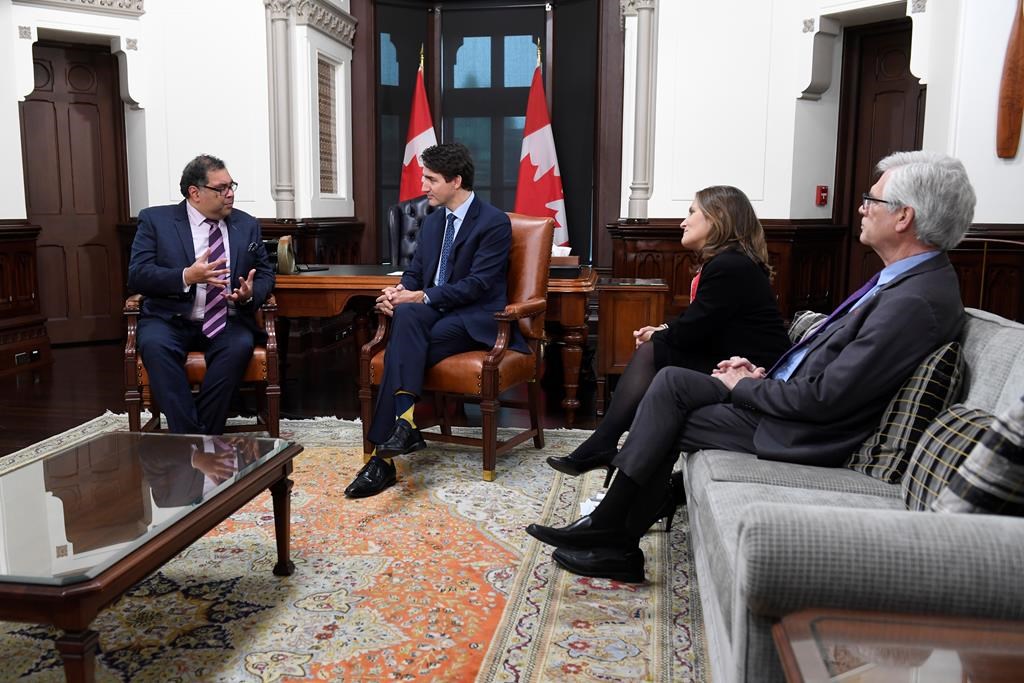Prime Minister Justin Trudeau unveiled major changes to the federal cabinet Wednesday that saw Chrystia Freeland promoted to deputy prime minister — resurrecting a position that has been unused for the last 13 years.

While Freeland will be retaining the responsibility for Canada-U.S. relations, she will be leaving her post as minister of foreign affairs and filling the roles of Canada’s 10th deputy prime minister and minister for intergovernmental affairs.
Trudeau said Wednesday that Freeland, who is Alberta-born, will be focused on western alienation, allowing her to take a key leadership role in what have been increasingly contentious relations with provinces dominated by Conservative premiers.
“Chrystia and I have worked very closely on some of the biggest files facing Canada,” Trudeau told reporters after the swearing-in ceremony at Rideau Hall.
But what exactly is the deputy prime minister’s role? And what does it do?
The position is still considered a relatively new one and was created by Trudeau’s father, former Prime Minister Pierre Trudeau, in 1977. With no formal job description, it changes year-to-year.
How much power the position holds, or where that power puts the deputy prime minister in the hierarchy of cabinet ministers, really depends on who’s in charge.
The role, however, isn’t the Canadian equivalent of a U.S. vice-president. If Trudeau is unable to maintain his position, the job does not go to Freeland. But the role itself has no set definition.
While it’s an honorary title, past deputy prime ministers have played a variety of roles, as determined by the prime minister.

Sheila Copps, who was deputy prime minister under Jean Chrétien in 1993, called the role a “backstop” for the prime minister, to help with the “troubling issues of the day.”
“If there is a crisis in the house or a parliamentary crisis, then you became a front person,” she said. Consequently, Copps said, the deputy prime minister can also become a “lightning rod in the House of Commons for any of the opposition attacks.”
Copps said her time in the position, which is supported by the Privy Council Office, would vastly differ from Freeland’s. She recalled around 31 hours per week in meetings devising strategies on Parliament Hill, chairing both the social and economic cabinet committees, speaking on behalf of the prime minister and helping Chrétien with internal disagreements.
“I spent a lot of time taking questions in the House for overall government approaches,” said Copps.
“In the war against the Spaniards for fish, Mr. Chretien wanted to make sure that I was at the war cabinet because he knew that I could be counted on to support his position.“
Copps said she expects Freeland’s real challenge will be shifting from her former role to her current position, one that is more “political than it is diplomatic,” which Freeland may have been used to as foreign affairs minister.
According to the Government of Canada, Freeland is number two by order of precedence, right under Trudeau.
Paul Wilson, an associate professor at the Clayton H. Riddell Graduate Program in Political Management at Carleton University, said it reflected Freeland’s “significant” level of influence within the government.
“She’s in a position to speak for the government,” said Wilson.
“And when she speaks as deputy prime minister, she’ll have some weight to speak on behalf of the government on these issues.”
The portfolios of the deputy prime minister have also varied in the past. Many deputy prime ministers have also kept their ministerial positions during their time as deputy prime minister.
Erik Nielsen, who was deputy prime minister under Brian Mulroney in 1984, also served as minister of national defence. Copps also served as environment minister in 1993.
“It really is a question of what the prime minister is looking for in terms of whether it’s managing the caucus, managing the government agenda, sending a signal about government priorities,” said Wilson.
“There is no job description.”
Not every prime minister chooses to have a deputy. Neither the Stephen Harper or Joe Clark governments appointed a deputy prime minister, and Trudeau went without a deputy throughout his first term. The most recent deputy premier was Anne McLellan in 2003, who was appointed by then-prime minister Paul Martin.
Wilson said Freeland’s work in foreign affairs found her “broadly respected across party lines,“ which was a factor in Trudeau’s selection process.
Following the swearing-in ceremony Wednesday, Trudeau also cited CUSMA negotiations as part of the reason he is bringing her into the new position.
“She was emerging as one of those one of the stronger performers,” said Wilson.
“In the current context of difficult relations with some provinces, particularly out west, it would be useful to have her involved with that of the G8 and the intergovernmental affairs minister and to bolster her gravitas as being deputy prime minister.”





Comments